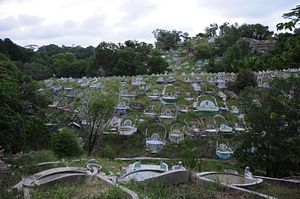Parts of China are facing a strange but completely logical phenomenon: A lack of gravesites.
After decades of the one child policy, China has found itself with a rapidly aging population. With that has come the associated problems such as a strain on the health care system, retirement pensions, and, of course, a lack of burial plots.
China is in fact, one of the fastest aging populations in the world. The World Bank estimates that close to 10 percent of China’s population is over 65, while the United Nations expects that figure to exceed 25 percent by 2050.
As large a land mass as China is, the majority of the country’s population is concentrated around the coastal areas. To further add to the population problem, cities such as Shanghai and its surroundings, including Suzhou, have seen an influx of migrant workers from other parts of China. Not only are there more jobs and opportunities in these often industrial port cities, but public amenities are better funded too.
In China’s larger cities such as Beijing, Shanghai, and Suzhou, city governments have implemented housing restrictions based on the hukou, a form of household registration. The hukou system has existed in some form for thousands of years in China. In the past, it was mostly used to keep track of patriarchal family records. But when the Communist Party came to power in the 1950s, the system became a convenient way to restrict movement and control the population.
Hukous limit housing and sometimes social benefits to those who are registered to live in a certain area. For example, the official registered population of Suzhou in Jiangsu province is approximately 6.5 million, with an approximately equal amount of migrant workers. Neighboring Shanghai is officially home to 13 million, with an additional 11 million migrant workers. These migrant workers are not automatically granted a hukou, which means these people, along with their children, are not entitled to the same privileges as their native Suzhou or Shanghai counterparts. They are often restricted as to where they can live and where their children can study, making them effectively second-class citizens.
And now migrant workers will also be restricted as to where they can be buried. Suzhou has become the country’s first city to ban the purchase of local grave sites by people without local hukou, according to Suzhou Daily.
There are 30 commercial cemeteries in Suzhou city, providing approximately 420,000 graves. In 2011, a local newspaper reported that grave sites would be sold out within 20 years, based on an annual death toll of 42,000. However, in 2015, after factoring in purchases from outside Suzhou, the local government announced that the city’s supply of graves was expected to run out in five years’ time. According to one grave agent in the city, 60 percent of his clients come from the nearby city of Shanghai, while a further 20 percent came from neighboring Zhejiang province.
The new restrictions also limit the size of new grave sites. A single-person grave can be no larger than 0.7 square meters, while a combined grave (for a couple, for example) is restricted to 1 square meter or below.

































